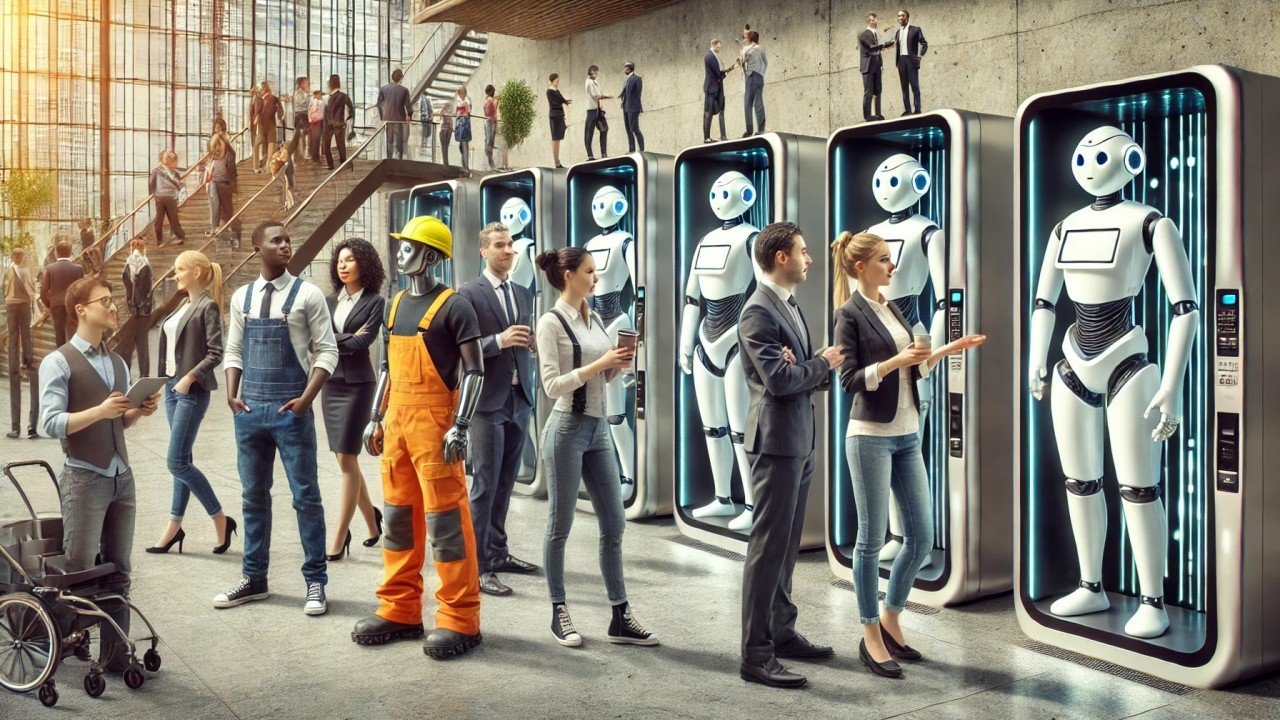AI – Human Touch Hybrid Model? - The Recruitment Industry...
Brian Kennedy , Staffing industry M&A guru, reposted my recent scribbles “To AI or to Automate? So be the question!...or, as the co-pioneer of BPR, Michael Hammer quoted: "Don’t Automate, Obliterate!"” See: https://www.linkedin.com/posts/briankennedy81_ai-automate-obliterate-activity-7285703876882706432-3r0f?utm_source=share&utm_medium=member_desktop
Brian, thanks for the repost – yup, we’ve wading into a quagmire of confusion, and riddled with scope for naming, blaming, shaming and potential intentional ignorance…
I do, however, also think that this “supe-hype” of AI everywhere, scares folks that may not be that tech savvy…
Re you comment/question, “I’m curious, how do we strike the right balance between efficiency and maintaining a meaningful and personal candidate/customer experience? Should there be intentional “human touchpoints” built into AI-driven workflows to avoid making applicants feel like they’re talking to a vending machine? Curious to hear your take on this.”
I am by no means an AI expert, merely someone trying to wrap my head around this ever-changing landscape of AI/Automation… My 10c is this (apologies for the length, as I can’t sum it up in a few sentences without some context):
AI has increasingly been combined with human touchpoints in the screening, vetting, and interviewing processes for jobs for many, many years - This hybrid approach should by al intense and purposes leverage the efficiency and scalability of AI while retaining the human insights essential for nuanced decision-making.
For a long time now, we’ve had AI-powered applicant tracking systems (ATS) and resume screening tools analyse resumes and applications to identify candidates whose qualifications match job requirements. (Albeit questionable at times – this being said, the adage applies “garbage in – garbage out.”). These systems use natural language processing (NLP) and machine learning to evaluate keywords, experience, and skills. The Human Touch comes into play with recruiters/hiring folk reviewing the AI shortlist to ensure that the candidates align with the company's culture, mission, and less quantifiable criteria. (Again, this is if they fully understand the aforementioned!)
Also, AI administers and scores assessments for skills, aptitude, personality, and cognitive abilities. Examples include coding challenges, situational judgment tests, and gamified assessments. The Human Touch Human Touch comes into play with professionals interpreting the results, especially for traits like cultural fit, leadership potential, or creativity, which AI might not fully grasp.
We’ve had Video Interviewing around for eons, now we have AI tools analyse pre-recorded or live video interviews to assess tone, body language, word choice, and even micro-expressions. Tools like HireVue or MyInterview often use algorithms to rate candidates based on predefined metrics. The Human Touch here has recruiters or hiring managers review AI-generated insights alongside the interview recordings to make more holistic judgments. The question is, do they do so or use the AI the filter only?
We have Chatbots answer FAQs, schedule interviews, and provide updates on application status, ensuring quick and consistent communication with candidates. I have heard mixed views on this - never personally experienced it, only when using other services, e.g. chasing “Uncle Jeff” (Amazon) packages, insurance queries etc., – again, my experience has been mixed.
The Human Touch here has recruiters step in for personalised interactions, especially for senior roles or unique candidate concerns. Hence, I can see AI interaction playing a more “human acceptable” role at the ‘non-skilled/semi-skilled/blue collar type” level for temporary labour. No disrespect to the level intended here – I have just seen over the years these hard working folk having to come into the office and apply for a role, having to complete a bible full of documents, only to get frustrated and walk out…be it paper based, or on line…
We have background checks and vetting where AI speeds up these checks by verifying employment history, educational credentials, and criminal records through automated systems. The Human Touch then investigate discrepancies or nuances flagged by AI, such as unverifiable references or ambiguous information. But again – it all depends on what the “machine has been fed” what to check for ….
When it comes to final interview and decision-making; AI might provide suggestions based on aggregate data from previous successful hires or predictive analytics to identify likely top performers, with the Human Touch handling final interviews usually conducted entirely by humans, allowing hiring managers and teams to assess interpersonal and situational responses directly.
Potential advantages of “AI – Human Touch Hybrid”
Efficiency: AI manages repetitive tasks, enabling quicker candidate processing.
Reduced Bias: AI can help reduce human biases in the initial screening stages by focusing on objective criteria.
Personalisation: Human touch ensures empathy and judgment are applied in areas where AI lacks emotional intelligence.
Scalability: Combining AI with human insights allows organisations to manage large volumes of applicants without sacrificing quality.
Potential challenges
Bias in AI algorithms: If the training data reflects historical biases, AI tools might perpetuate them.
Over-Reliance on AI: Critical nuances in candidates’ potential might be missed if too much trust is placed in AI.
Candidate Experience: Poorly implemented AI systems might feel impersonal, alienating candidates.
Overall, this integrated approach “should” optimise the hiring process by balancing technological efficiency with human intuition. BUT, to me the number one key fundamental is CLEAR and CONSTANT COMMUNICATION to all that will be interacting with the company (external and internal), that AI (and/or Automation) is part of the company's daily modus operandi, the reasons for use, benefits, and FAQ’s – with constant subtle reminders, step by step…
Hope this makes sense! (-:
MC

